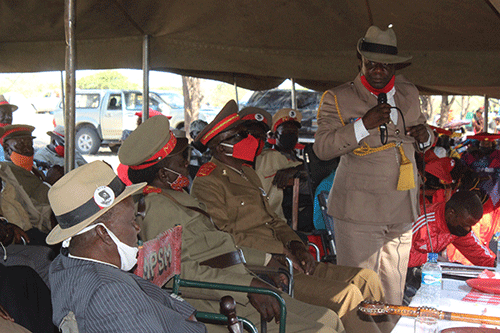Chief of the Maharero Royal House, Tjinaani Maharero, has raised concern over the lack of genocide history in schools’ curricula, claiming that this leads to academic genocide and intellectual deprivation.
Maharero brought up the issue during the 99th Commemoration of the Reburial of Supreme Chief Samuel Maharero at Okahandja over the weekend.
Germany massacred an estimated 80 000 Ovaherero and Namas at the turn of the 20th century and last year agreed to apologise for the genocide and extend financial assistance worth N$18 billion to the descendants of affected communities, despite the rejection by the majority of affected communities.
“Namibian education system must embrace the history and cultures of all of its inhabitants. It is sad to note that the history of genocide is not taught at all in the Namibian curriculum, which creates an intellectual deprivation and academic genocide of its own,” Maharero said while addressing his subjects on Sunday.
“We demand that the issue be taken up instantaneously by the Cabinet of the Republic of Namibia and effective rectification be made immediately.”
Furthermore, Maharero also called on parliament to wrap up its discussion of the genocide package and to start renegotiation with immediate effect.
“Today, exactly a year and a half after we rejected the German offer and almost a year after the debates in Parliament concluded, we are demanding that the deal be renegotiated and that these negotiations commence immediately as in yesterday,” he said.
“We are also demanding that we be at the negotiation table to speak on our behalf. The agenda for reparations should not be hijacked by a few for their own gains, and our government should take heed that we are very serious about this matter.”
Maharero added his community hopes that the new negotiations will yield better fruit and conclude with a positive outcome.
He also urged parliament to swiftly approve a measure designating 28 May as Genocide Remembrance Day because it was on that day that the official and formal closure to the Ovaherero and Nama genocide episode was reached when all concentration camps in Namibia were ordered to close in 1908.
“This is the day when our ancestors, who were imprisoned in the notorious concentration camps, were released and it is proper that we give it that significance,” he said.
Maharero said for the past seven years, the community he leads has opted to work with the government to negotiate for our people based on the resolution of parliament of 2006.
“We did this in search of restorative justice and to find a lasting solution for the suffering and genocidal acts committed by the German imperial government,” he said.
“After more than six years of protracted negotiations, Germany offered to recognise that a genocide took place in Namibia, that they will offer an apology, and that reparations will be paid to the descendants of victims of genocide.”
He said his community rejected the language of the proposed agreement and has not seen the written apology yet.
“We rejected the offer of 1.1 billion euros, which we said was seriously insignificant to even atone for the blood of our people and the souls that perished during that brutal period of colonial occupation,” he said.
– ktjitemisa@nepc.com.na



